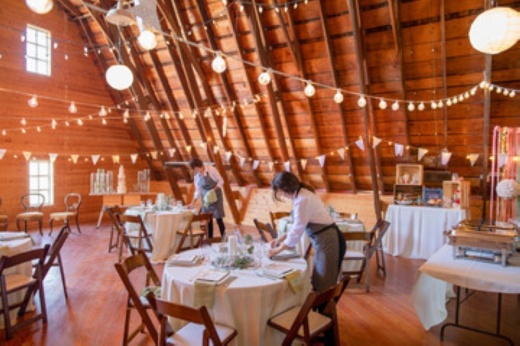“It’s not too hot. It’s not too cold. All you need is a light jacket,” Dyess said, quoting the film “Miss Congeniality.”
In her mind, April 25 was such a perfect date that she and fiancé Andrew Sawyer waited 18 months for it to land on a Saturday.
They had it all planned out: the flowers, the venue, the music, the caterer and the photographer were all booked and ready, until the week of March 16 when orders started to come down from county government reducing gatherings to 250 people or less. Then 50. Then finally, 10.
“In an hour and a half, things had already changed again,” Dyess said of her experience in trying to figure out what to do next. “It's been very stressful. There were a lot of tears this week.”
But the couple moved forward and decided their spring wedding with 180 guests at the Lone Oak Barn in Round Rock would be postponed until Sept. 19, the first date they could get.
In the meantime, the couple still plans to wed on April 25 with close friends and family in their backyard so as to maintain their perfect wedding anniversary date, but will celebrate with a big party in six months-time.
The Dyess-Sawyer couple are one of many that have had to change wedding plans last minute. And the wedding industry is one of many that has been hit drastically by coronavirus mandates coming at its busiest time of the year.
“In our world, busy season is in the spring, March-May, and fall, September-November,” said wedding planner Amerberly Adams-Thomas in an email to Community Impact Newspaper. “With the gathering restrictions starting mid-March and going till at least mid-May, we are all taking a hit to half our annual revenue.”
Adams-Thomas of Blue Boot Events said many vendors are working as best as they can to accommodate couples, like Dyess and Sawyer, that have postponed their weddings to the fall. But since it is another popular season spaces have quickly filled up.
“Companies that can take multiple events in a day will be very busy [in the fall], and may have to turn away some business in the future. However, those who can only take on one event in a day, such as most venues and photographers, will feel the results of this a little harder,” Adams-Thomas said.
Many vendors are also struggling with their established no-refundable deposit policies and these unforeseen circumstances.
Adams-Thomas said these policies have pushed vendors and couples to work on postponing events rather than canceling them completely.
“I feel like we all have the internal struggle of wanting to give our clients everything we can to help them get through this, but also worry about keeping our business afloat,” Adams-Thomas said.
M’Kensie Aday, site manager of Lone Oak Barn, said it is hard to tell in the moment how the postponements will affect her business, as weddings are often seen as a luxury and can be one of the first things put on hold or scaled down.
Aday added that she is usually booked every Saturday between March and May. As of March 23, about eight weddings had been postponed, she said.
Aday said the business has changed its policies and has waived transfer fees for any couple looking to re-book. But Aday, like Adams-Thomas, recognized the desire to help clients but also sustain business.
“Most of us are small business owners,” Aday said. “We have to balance the sustainability of our business with our heart for our clients and wanting to do everything we can to help them through this transition. But at the end of the day, we are a small business, and we have to think about the future.”
Florist Rebecca Bonura with Wild Poppy in Georgetown said she is taking it one day at a time. Flowers for events are typically ordered a month in advance but Bonura said luckily all of her events have been rescheduled.
“Vendors across the board in the wedding industry have really been affected in the way that a lot people wait for that final payment to pay employees and to keep things going,” Bonura said.
She added this is also having an impact on flower growers around the world.
“So much of this has put a halt to their sales and made so many of the growers that I love and work with go out of business already,” Bonura said. “This is peak season for spring flowers, and it is so heartbreaking to see so many go unpurchased and unused.”
Nonetheless, Bonura said she is trying to stay positive.
“There’s a pause in [work] now, but we’ll come back stronger,” Bonura said. “Life goes on and love is so important and it is one of those things that keeps everyone going.”





